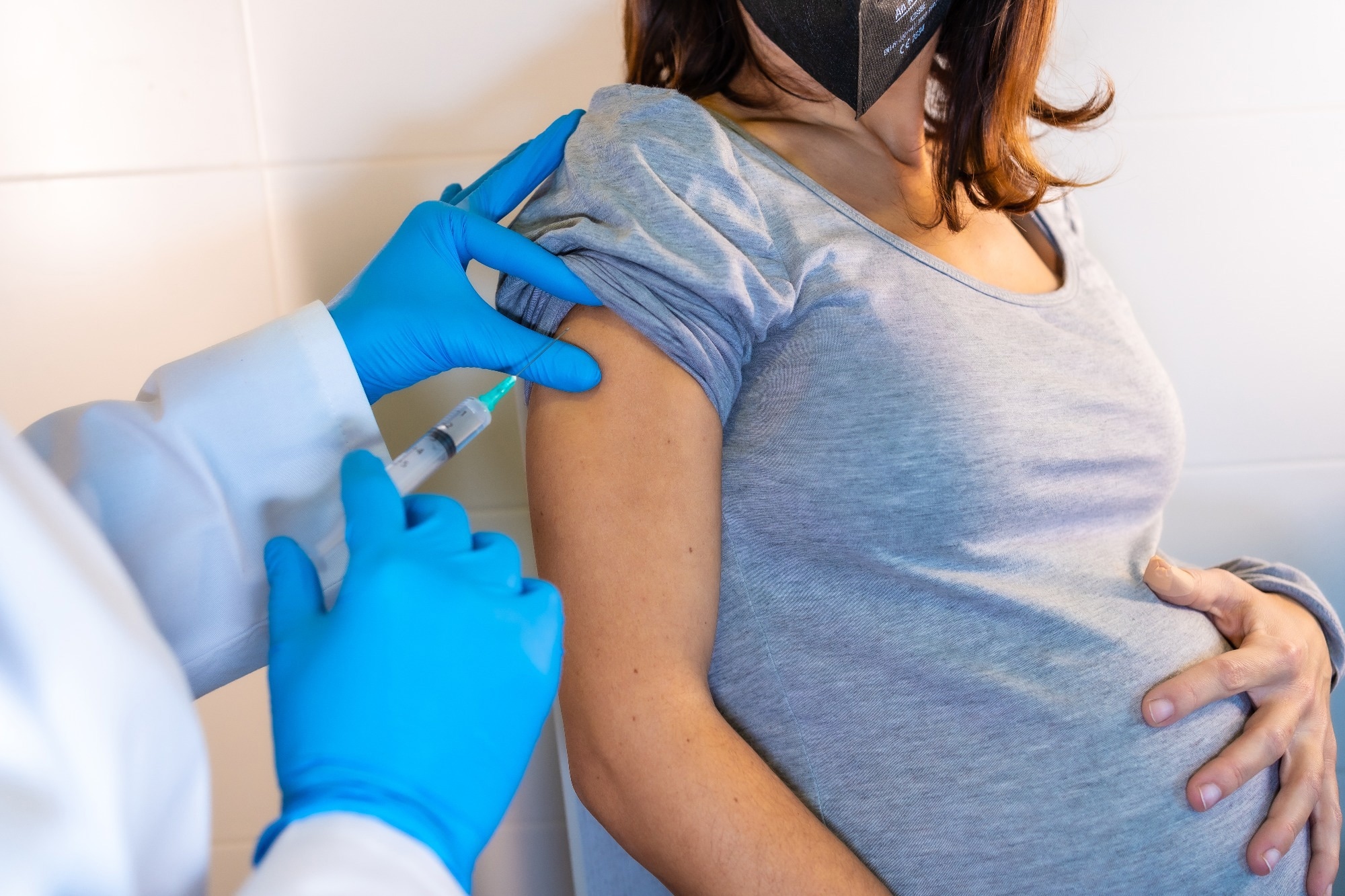In a recent study posted to the medRxiv* preprint server, researchers determined the association between messenger ribonucleic acid (mRNA) coronavirus disease 2019 (COVID-19) vaccinations and perinatal outcomes including congenital abnormalities, stillbirths, and premature births in Australia.
Studies have reported that COVID-19 vaccination in pregnant women reduces stillbirths; however, the association between COVID-19 vaccines and premature births is not certain. In addition, most studies on severe acute respiratory syndrome coronavirus 2 (SARS-CoV-2) vaccination during pregnancy had limitations in their methodologies, such as time-varying exposures and fixed (retrospective) cohort bias.
 Study: Reductions in stillbirths and preterm birth in COVID-19 vaccinated women: a multi-center cohort study of vaccination uptake and perinatal outcomes. Image Credit: Unai Huizi Photography / Shutterstock
Study: Reductions in stillbirths and preterm birth in COVID-19 vaccinated women: a multi-center cohort study of vaccination uptake and perinatal outcomes. Image Credit: Unai Huizi Photography / Shutterstock
About the study
In the present multi-center and retrospective cohort study, researchers assessed the role of mRNA COVID-19 vaccinations in improving pregnancy outcomes by decreasing premature births and stillbirths.
Data were obtained from 12 public hospitals in Melbourne city of Australia, on births after 20 gestational weeks, between July 1, 2021, and March 31, 2022, under the collaborative maternity and newborn dashboard for the COVID-19 pandemic (CoMaND) research project. Planned home births, private hospital births and those not a part of public-funded home birth programs were not included in the analysis.
The week of last menstrual period (cLMP) was used for the analysis instead of the birth week for defining the groups exposed and unexposed to COVID-19 vaccinations to ensure that any woman giving birth between week 20 and week 43 of gestation would be included in the analysis. In addition, women with multifetal pregnancies were excluded from the study.
The team analyzed socio-demographic characteristics of the pregnant women and pregnancy outcomes were comparatively assessed for the vaccinated and non-vaccinated pregnant females, for whom gestational week 20 to week 43 were in the data extraction period of nine months. The team also generated a socioeconomic index for areas (SEIFA) and vaccination status choropleth maps for the analysis.
The study's primary outcome was the congenital anomaly rate in single infants born after 20 gestational weeks among women who received COVID-19 vaccinations in pregnancy. Secondary pregnancy outcomes included stillbirths, premature births (iatrogenic and spontaneous), fetal growth restrictions indicated by fetal birth weight under the third centile, and neonatal intensive care unit (NICU) admissions were assessed for single infants born after 24 gestational weeks without any congenital anomalies.
The adjusted odds ratios (aORs) of stillbirths, premature births and NICU admissions were calculated for children born to mothers who have received COVID-19 vaccinations during pregnancy by performing inverse-propensity-weighted-regression adjustments (IPTWRA). In addition, a sensitivity analysis was performed by analyzing only women initially vaccinated at <20 weeks of gestation.
Results
The analysis was performed for 32,536 pregnant women who gave birth to 33,018 newborns, of which 53.4% (n=17,365) women were vaccinated, whereas 47.6% (n=15,171) women did not receive mRNA COVID-19 vaccines during pregnancy. Women who received COVID-19 vaccinations had an increased likelihood of greater age, non-smoking habits, nulliparous, not having interpreter requirements, living in high-income areas, and vaccinations against influenza and pertussis.
Substantial differences were observed in the rates of vaccination by birth region. The aORs of vaccination were lower among women who had been birthed in the Middle East, East Europe, South Europe, Oceania, and Africa. Women who received COVID-19 vaccines during pregnancy were substantially less likely to give birth to infants with significant congenital anomalies in comparison to the unvaccinated women (2.4% versus 3.0% and aOR 0.7). The finding was consistent even after restricting the analysis to women who received COVID-19 vaccines before 20 gestational weeks.
COVID-19-vaccinated pregnant women had substantially lower stillbirth rates (0.2% versus 0.8% and aOR 0.2), premature births in less than 37 weeks of gestation (5.1% versus 9.2% and aOR 0.6), spontaneous premature births (2.4% versus 4.0% and aOR 0.7) and iatrogenic premature births (2.7% versus 5.2% and aOR 0.5). No substantial increases were observed in birth weights below the third centile among the COVID-19-vaccinated women, indicating no adverse impacts of COVID-19 vaccinations on fetal development and growth.
Overall, the study findings showed that stillbirths and premature births were lower among COVID-19-vaccinated women and that mRNA COVID-19 vaccinations could have beneficial biological implications in pregnancy other than decreasing COVID-19 severity.
*Important notice
medRxiv publishes preliminary scientific reports that are not peer-reviewed and, therefore, should not be regarded as conclusive, guide clinical practice/health-related behavior, or treated as established information.
- Reductions in stillbirths and premature birth in COVID-19 vaccinated women: a multi-center cohort study of vaccination uptake and perinatal outcomes. Lisa HUI, Melvin Barrientos Marzan, Daniel L. Rolnik, Stephanie Potenza, Natasha Pritchard, Joanne M. Said, Kirsten R Palmer, Clare L. Whitehead, Penelope M. Sheehan, Jolyon Ford, Ben W. Mol, Susan P. Walker. medRxiv preprint 2022, DOI: https://doi.org/10.1101/2022.07.04.22277193, https://www.medrxiv.org/content/10.1101/2022.07.04.22277193v1
Posted in: Child Health News | Medical Research News | Medical Condition News | Women's Health News | Disease/Infection News
Tags: Birth Weight, Children, Congenital Anomaly, Coronavirus, Coronavirus Disease COVID-19, Hospital, Influenza, Intensive Care, Neonatal Intensive Care, Newborn, Pandemic, Pertussis, Pregnancy, Research, Research Project, Respiratory, Ribonucleic Acid, SARS, SARS-CoV-2, Severe Acute Respiratory, Severe Acute Respiratory Syndrome, Smoking, Stillbirth, Syndrome

Written by
Pooja Toshniwal Paharia
Dr. based clinical-radiological diagnosis and management of oral lesions and conditions and associated maxillofacial disorders.
Source: Read Full Article
